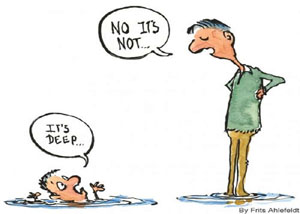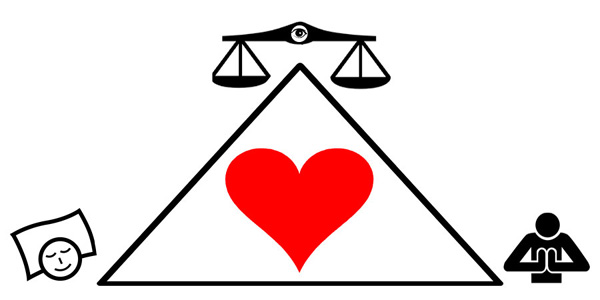Our Power Perspective
“Mental Health: A state of well-being in which the individual realizes his or her own abilities, can cope with the normal stresses of life, can work productively and fruitfully, and is able to make a contribution to his or her community.”
– Segen’s Medical Dictionary, 2012
The definition above is nearly perfect in summarizing our focus today, except that it uses the term mental  health, when we would prefer to use “emotional health.” Why? Because it’s pretty clear in common society when someone is “mentally ill” but living out a state of emotional health is a daily act of balance, adaptation and self-care, just like physical health.
health, when we would prefer to use “emotional health.” Why? Because it’s pretty clear in common society when someone is “mentally ill” but living out a state of emotional health is a daily act of balance, adaptation and self-care, just like physical health.
Most of our consistent community of readers are seeking living wellness, and key to that is emotional health. As the graphic above illustrates, emotional health involves the interaction of adequate sleep, gratitude and a balanced perspective. “Everything is interconnected,” said Dr. Alex Korb, when looking at emotional health in his book The Upward Spiral.
Korb noted that “Gratitude improves sleep. Sleep reduces pain. Reduced pain improves your mood. Improved mood reduces anxiety, which improves focus and planning. Focus and planning help with decision making. Decision making further reduces anxiety and improves enjoyment.” (Baker, 2015).
We’ve looked at the benefits of gratitude a great deal here, and recently observed the unquestionable value of good sleep on maintaining holistic well-being. Those two components are the very real foundation of emotional health. Today we’ll look closer at the pinnacle of our emotional health triangle, the capstone which joins it all together; balanced perspective.
Perspective is Personal
“As a man thinks in his heart, so is he. As a man sees in his heart, so he sees….we see things not as they are but as we are.”
– Jersey Journal, 1914
We must take into account our perspective of ourselves, the world and also our view on our past, present and future. If these three perspectives are balanced, then we will be in greater emotional health.
 San Francisco State University researchers Jia Wei Zhang, Ryan T. Howell and Maciej Stolarski, found that “five time perspectives that are important in” maintaining emotional health, ranging from extremely detrimental like hedonistic or fatalistic to more balanced views of our time. “Recent studies have demonstrated that this five factor structure is consistent even across culture,” they said.
San Francisco State University researchers Jia Wei Zhang, Ryan T. Howell and Maciej Stolarski, found that “five time perspectives that are important in” maintaining emotional health, ranging from extremely detrimental like hedonistic or fatalistic to more balanced views of our time. “Recent studies have demonstrated that this five factor structure is consistent even across culture,” they said.
In gauging our healthy perspective on time, we must ask ourselves where we fall on that continuum right now and where to we live most often. While a few of the perspectives may be more detrimental than others, they each have a time, place and purpose. We all have people in our lives who are so present-hedonist that they never plan, so past focused that they are forlorn for better days or so goal driven that they miss the moment. None of these, as a constant, are helpful, but also no one wants a fatalistic or goal driven person at a party when it’s better to get a little hedonistic.
“If you’re really dominant in one type of perspective, you’re very limited in certain situations,” Howell said. “To deal well when you walk into any situation, you need to have cognitive flexibility. That is probably why people with a balanced time perspective are happiest” (Vlasto, 2012).
 Scott C. Roesch, Bernard Weiner and Allison A. Vaughn gathered empirical evidence on how healthy perspectives on ourselves and the world led to greater emotional health in and out of crisis. They looked at “four cognitive factors: appraisals, attributions, self-efficacy, and general perceptions of stressors” that are key to how we cope with life. In short, they found that our personal perspective on the stressor, how it happened, and our ability to overcome it “is crucial in that it varies from person to person, and sets the stress and coping process in motion” (2012).
Scott C. Roesch, Bernard Weiner and Allison A. Vaughn gathered empirical evidence on how healthy perspectives on ourselves and the world led to greater emotional health in and out of crisis. They looked at “four cognitive factors: appraisals, attributions, self-efficacy, and general perceptions of stressors” that are key to how we cope with life. In short, they found that our personal perspective on the stressor, how it happened, and our ability to overcome it “is crucial in that it varies from person to person, and sets the stress and coping process in motion” (2012).
A balanced response to stress is as simple as our point of view. Their research “has shown that appraising a stressor as a threat is associated with negative psychological and physical adjustment, whereas appraising a stressor as a challenge is associated with positive psychological and physical adjustment.” Thus, if we see the hardships of our life as a present challenge, not a constant threat, and we either see ourselves as able to meet the challenge or able to find the right help, we have a balanced perspective on ourselves and the world, and greater chance at success (Roesch, Weiner & Vaugh, 2012).
Perspective is Power
“A penny will hide the biggest star in the Universe if you hold it close enough to your eye.”
– Samuel Grafton, Columnist
Roesch, Weiner and Vaugh (2012) urged that rather than seeking more coping skills to deal with stress, we should focus more on our “belief or meaning systems” and find our power in our perspective. Remember Segen’s Medical Dictionary defined emotional health is a “state of well-being in which the individual realizes his or her own abilities.” It is within our abilities to find ways to get solid rest, be grateful and balance our perspectives on world, self and time.
Howell and the SFU team found that “if you can look fondly at the past, enjoy yourself in the present, strive for future goals and hold these time perspectives simultaneously (and don’t go overboard on any one of them) you’re likely to be a happy person” (Vlasto, 2012).
Most of all, if we look at the idea of living emotionally healthy not as an impossibility but as a challenge in which we already have strengths, growth opportunities and help in achieving, then we’re already building our power perspective.
__________________________________________________
*The Emotional Health Triangle and formula is © 2015 Keith Karabin and KeithKarabin.com
Alex Korb PhD (2015) The Upward Spiral: Using Neuroscience to Reverse the Course of Depression, One Small Change at a Time. New Harbinger, Oakland, CA
Barker, E. (2015) New Neuroscience Reveals 4 Rituals That Will Make You Happy. Retrieved from: http://www.bakadesuyo.com/2015/09/make-you-happy-2/
Roesch, S., Weiner, B. and Vaughn, A. (2002) Cognitive Approaches to Stress and Coping. Current Opinions on Psychiatry. 2002;15(6) Retrieved from: http://www.medscape.com/viewarticle/444154
Vlasto, T. (2012) Scientific study: Key to happiness is a balanced perspective of time. Examiner.com. Retrieved from: http://www.examiner.com/article/scientific-study-key-to-happiness-is-a-balanced-perspective-of-time


